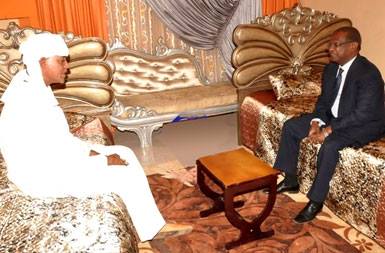Sudan’s intelligence chief holds meeting with Janjaweed leader
June 4, 2015 (KHARTOUM) – The director of the Sudanese National Intelligence and Security Services (NISS) Mohamed Atta al-Moula met on Thursday with leader of the Darfurian Mahameed clan Musa Hilal at his residence in Khartoum before he was due to leave back to his hometown of Misteriyah in North Darfur.

It was Hilal’s first time in Khartoum since two years ago and for the purpose of attending president Omer Hassan al-Bashir swearing-in ceremony on Tuesday.
SMC said the meeting between Hilal and al-Moula tackled public issues.
Hilal had announced on Wednesday that he intends to discuss with government officials what he called “four pivotal issues” including the registration of his militia as political party, security arrangements, social reconciliation and political reforms.
He denied that he is part of the opposition, stressing that he would not rebel against the government.
But his recent history says otherwise.
He left Khartoum in mid-2013 and turned his militiamen against the governor of North Darfur state, Osman Kibir accusing him of feeding tribal conflicts in the state.
The notorious Janjaweed leader then started making statements critical of the ruling National Congress Party (NCP), of which he is a member, and calling for deep reforms.
Also, Hilal’s troops seized control of western localities in North Darfur state including Saraf Omra, Kutum, Kabkabiya, Al-Siraif, and El-Waha.
The tribal chief went further to announce the establishment of administrations in these localities, naming his forces the Sudanese Revolutionary Awakening Council (SRAC).
Last February, he threatened to prevent poll workers from entering his areas for the general elections held in April.
Hilal, became notorious as Janjaweed leader, after eruption of simmering conflicts in Darfur. He stands accused by many human rights groups of leading a terror campaign against the African tribes in Darfur.
But he has denied any wrongdoing and told Human Rights Watch (HRW) in a videotaped interview in 2005, that he only recruited militias on behalf of Sudan’s central government.
The Darfur conflict began in 2003 when an ethnic minority rose up against the Arab-dominated government in Khartoum.
In April 2006 the UN Security Council imposed financial and travel ban against Hilal for obstructing peace in Darfur. The then US president George Bush issued an executive order enforcing similar sanctions on them.
In January 2008, Bashir appointed Hilal as a special advisor for the Ministry of Federal Affairs in Sudan. He was also an MP in the previous parliament.
(ST)
